Letter from Lucy E Edwards to the editor of the Sydney Morning Herald
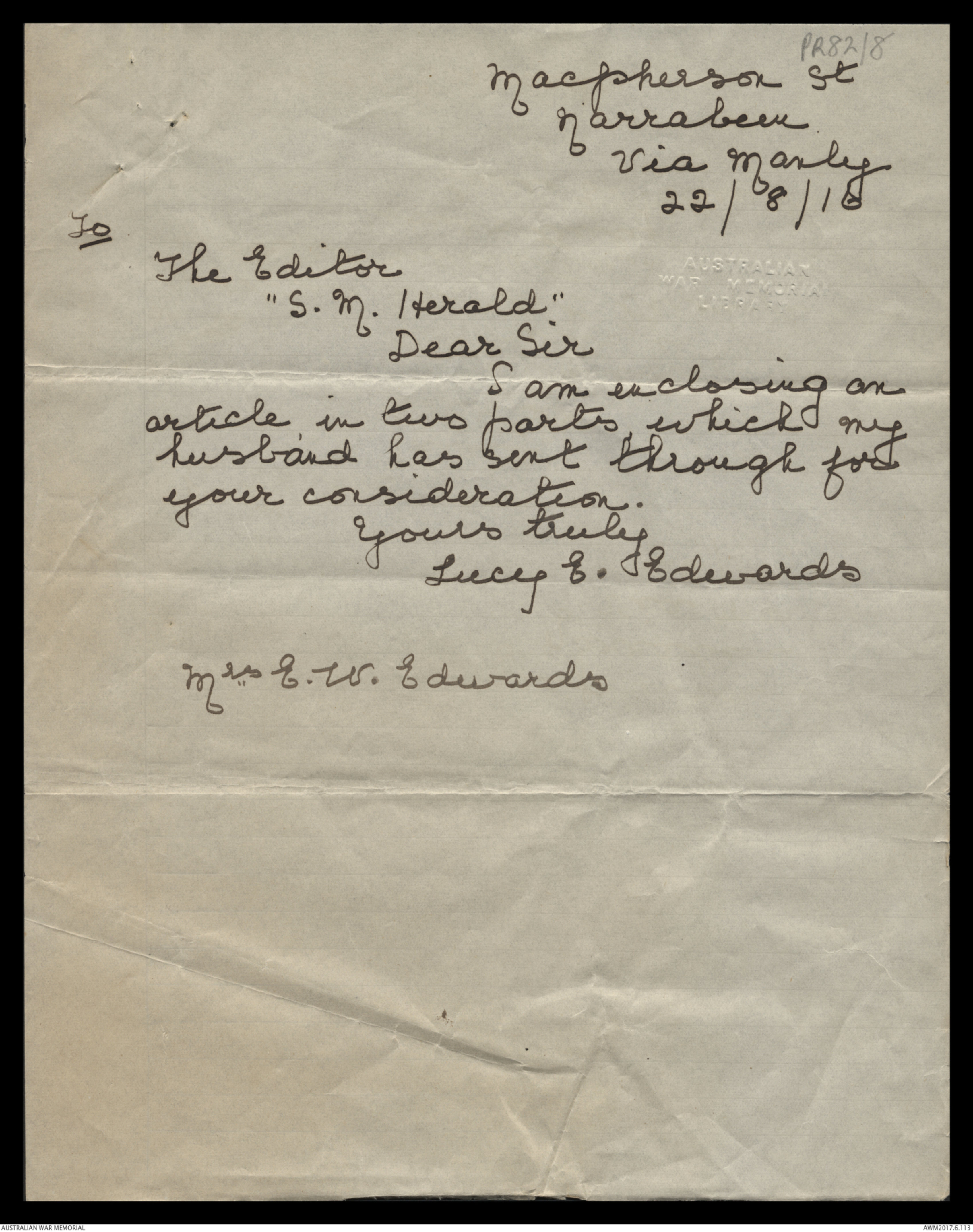
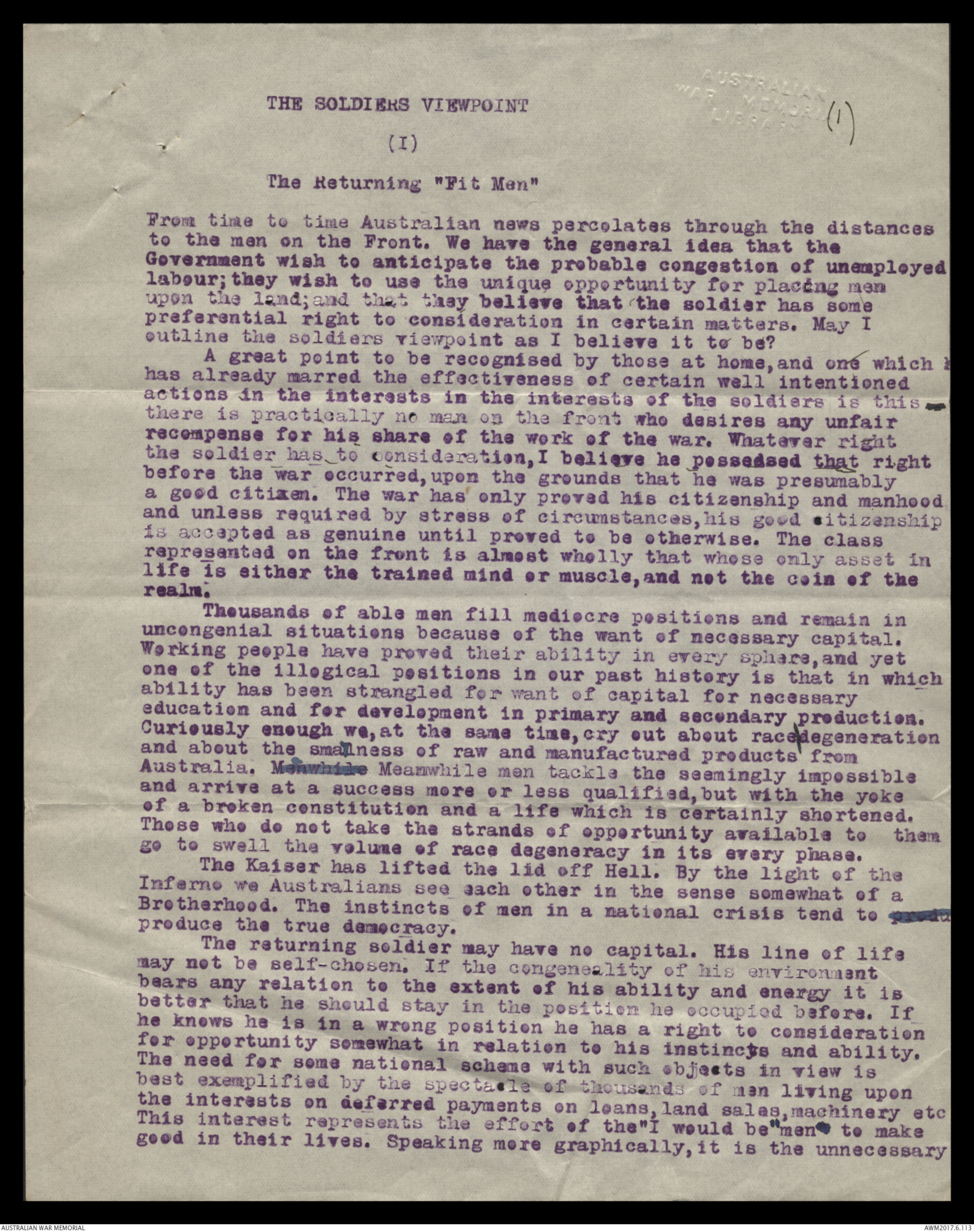
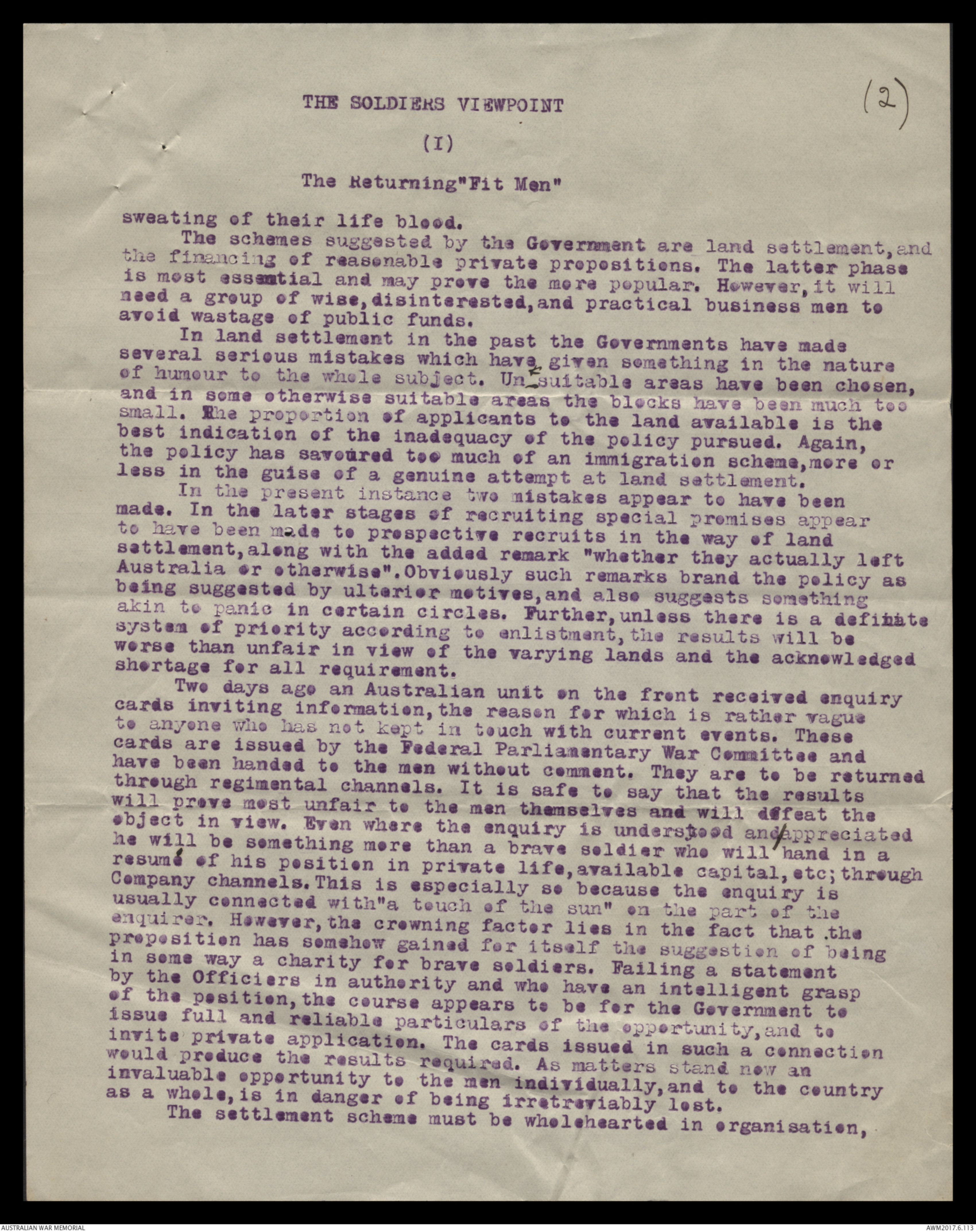

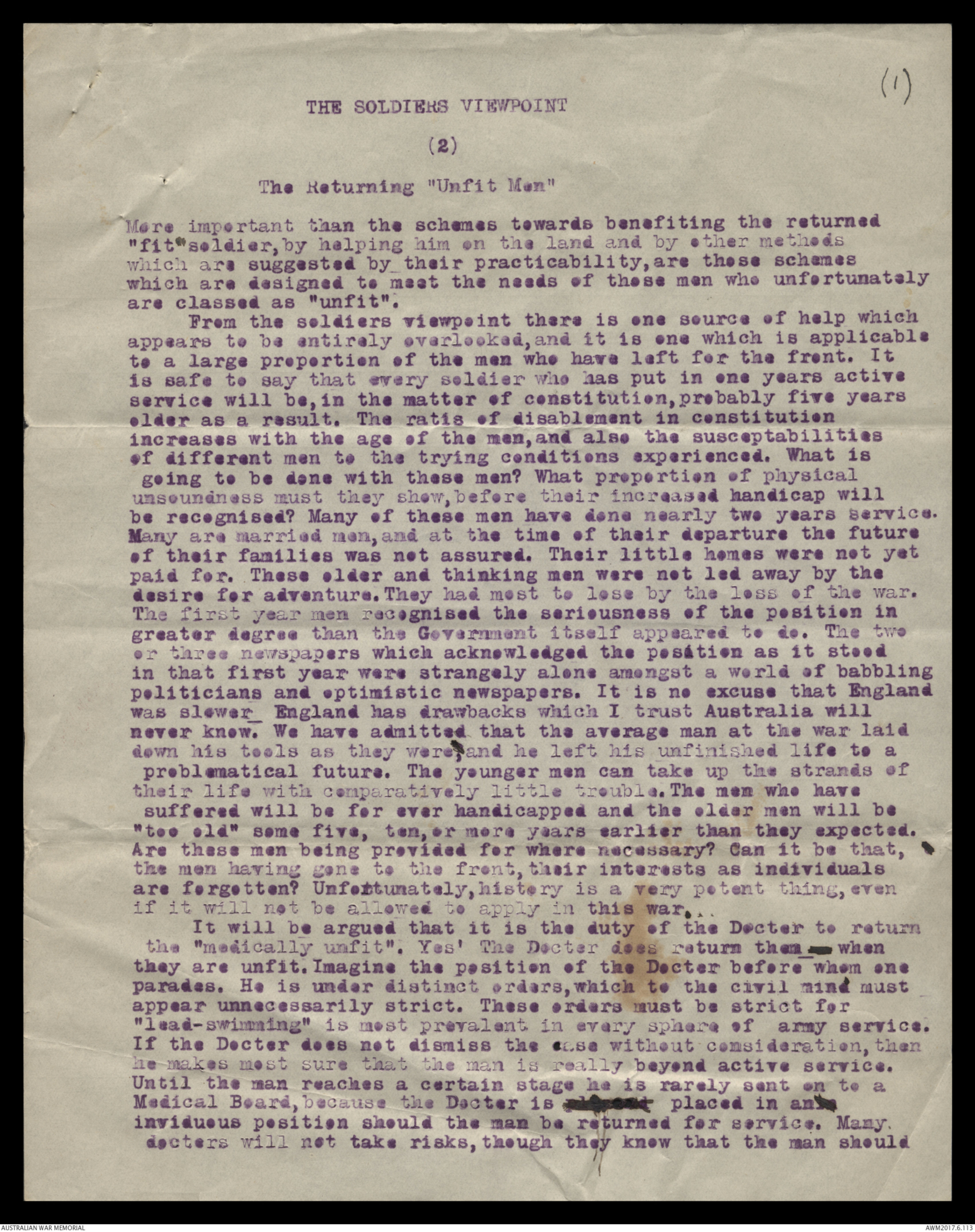
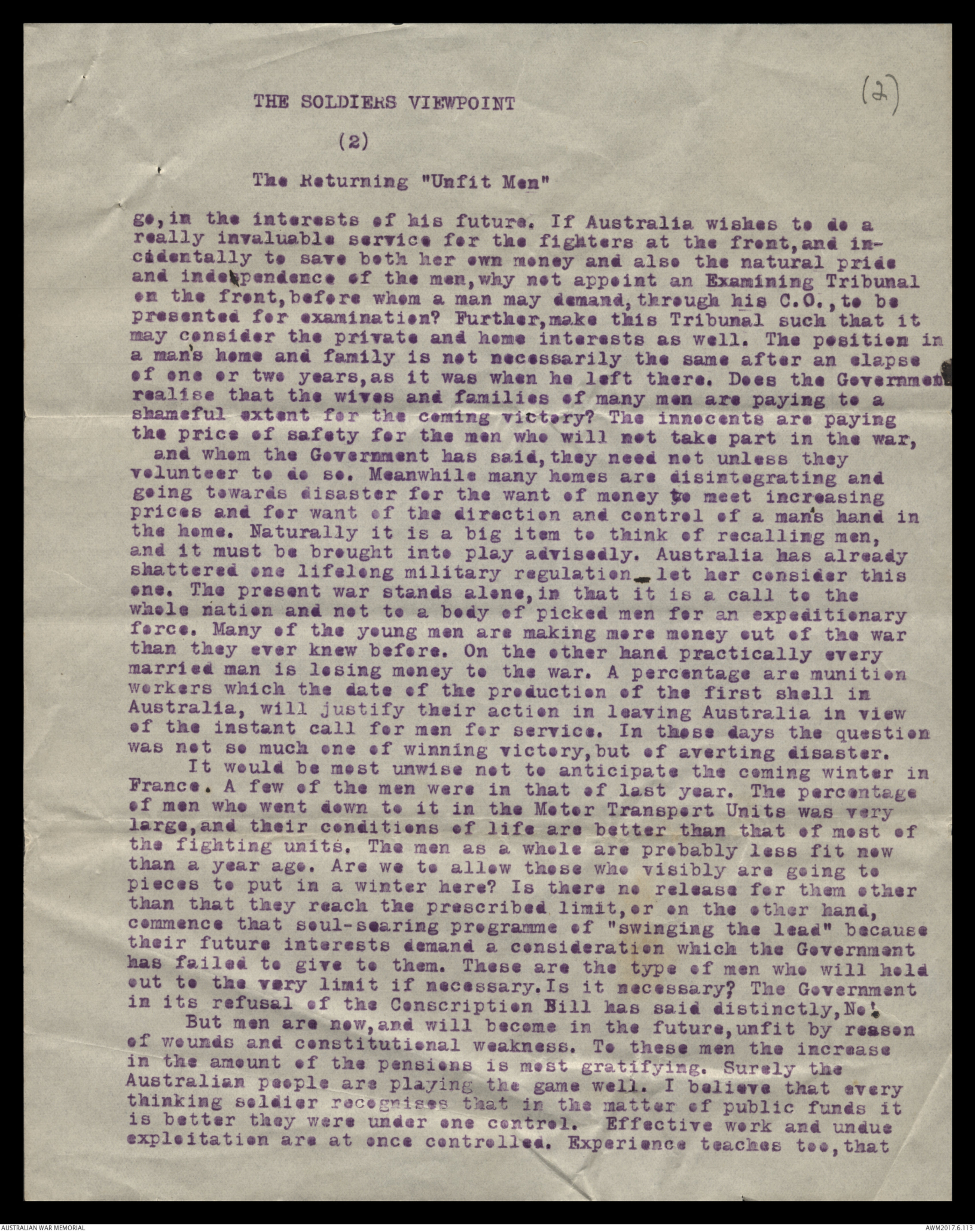

[*PR82/8*]
Macpherson St
Narrabeen
Via Manly
22/8/16
To
The Editor
"S. M. Herald"
Dear Sir
I am enclosing an
article, in two parts, which my
husband has sent through for
your consideration.
Yours truly
Lucy E. Edwards
Mrs E. W. Edwards
THE SOLDIERS VIEWPOINT [*(1)*]
(I)
The Returning "Fit Men"
From time to time Australian news percolates through the distances
to the men on the Front. We have the general idea that the
Government wish to anticipate the probable congestion of unemployed
labour; they wish to use the unique opportunity for placing men
upon the land; and that they believe that the soldier has some
preferential right to consideration in certain matters. May I
outline the soldiers viewpoint as I believe it to be?
A great point to be recognised by those at home, and one which
has already marred the effectiveness of certain well intentioned
actions in the interests in the interests of the soldiers is this
there is practically no man on the front who desires any unfair
recompense for his share of the work of the war. Whatever right
the soldier has to consideration, I believe he possessed that right
before the war occurred, upon the grounds that he was presumably
a good citizen. The war has only proved his citizenship and manhood
and unless required by stress of circumstances, his good citizenship
is accepted as genuine until proved to be otherwise. The class
represented on the front is almost wholly that whose only asset in
life is either the trained mind or muscle, and not the coin of the
realm.
Thousands of able man fill mediocre positions and remain in
uncongenial situations because of the want of necessary capital.
Working people have proved their ability in every sphere, and yet
one of the illogical positions in our past history is that in which
ability has been strangled for want of capital for necessary
education and for development in primary and secondary production.
Curiously enough we, at the same time, cry out about race\degeneration
and about the smallness of raw and manufactured products from
Australia. Meanwhile Meanwhile men tackle the seemingly impossible
and arrive at a success more or less qualified, but with the yoke
of a broken constitution and a life which is certainly shortened.
Those who do not take the strands of opportunity available to them
go to swell the volume of race degeneracy in its every phase.
The Kaiser has lifted the lid off Hell. By the light of the
Inferno we Australians see each other in the sense somewhat of a
Brotherhood. The instincts of men in a national crisis tend to produ
produce the true democracy.
The returning soldier may have no capital. His line of life
may not be self-chosen. If the congeneality of his environment
bears any relation to the extent of his ability and energy it is
better that he should stay in the position he occupied before. If
he knows he is in a wrong position he has a right to consideration
for opportunity somewhat in relation to his instincts and ability.
The need for some national scheme with such objects in view is
best exemplified by the spectacle of thousands of men living upon
the interests on deferred payments on loans, land sales, machinery etc
This interest represents the effort of the"I would be"menx to make
good in their lives. Speaking more graphically, it is the unnecessary
THE SOLDIERS VIEWPOINT [*(2)*]
(I)
The Returning "Fit Men"
sweating of their life blood.
The schemes suggested by the Government are land settlement, and
the financing of reasonable private propositions. The latter phase
is most essential and may prove the more popular. However, it will
need a group of wise, disinterested, and practical business men to
avoid wastage of public funds.
In land settlement in the past the Governments have made
several serious mistakes which have, given something in the nature
of humour to the whole subject. Un_suitable areas have been chosen,
and in some otherwise suitable areas the blocks have been much too
small. The proportion of applicants to the land available is the
best indication of the inadequacy of the policy pursued. Again,
the policy has savoured too much of an immigration scheme, more or
less in the guise of a genuine attempt at land settlement.
In the present instance two mistakes appear to have been
made. In the later stages of recruiting special premises appear
to have been made to prospective recruits in the way of land
settlement, along with the added remark "whether they actually left
Australia or otherwise". Obviously such remarks brand the policy as
being suggested by ulterior motives, and also suggests something
akin to panic in certain circles. Further, unless there is a definite
system of priority according to enlistment, the results will be
worse than unfair in view of the varying lands and the acknowledged
shortage for all requirement.
Two days ago an Australian unit on the front received enquiry
cards inviting information, the reason for which is rather vague
to anyone who has not kept in touch with current events. These
cards are issued by the Federal Parliamentary War Committee and
have been handed to the man without comment. They are to be returned
through regimental channels. It is safe to say that the results
will prove most unfair to the men themselves and will defeat the
object in view. Even where the enquiry is understood and/appreciated
he will be something more than a brave soldier who will hand in a
resumé of his position in private life, available capital, etc; through
Company channels. This is especially so because the enquiry is
usually connected with"a touch of the sun" on the part of the
enquirer. However, the crowning factor lies in the fact that the
proposition has somehow gained for itself the suggestion of being
in some way a charity for brave soldiers. Failing a statement
by the Officers in authority and who have an intelligent grasp
of the position, the course appears to be for the Government to
issue full and reliable particulars of the opportunity, and to
invite private application. The cards issued in such a connection
would produce the results required. As matters stand now an
invaluable opportunity to the men individually, and to the country
as a whole, is in danger of being irretreviably lost.
The settlement scheme must be wholehearted in organisation,
THE SOLDIERS VIEWPOINT [*(3)*]
(I)
The Returning "Fit Men".
including probably group systems of farming and also preliminary
qualifying courses upon experimental farms before one becomes
eligible.
At the moment of writing the thoughts of men at the front
are far from the question of employment after the war. The majority
are young and are blessed with the priceless optimism of youth.
It is certain however that the Government, or any Committee controlling
public funds in the interests of the men, will find that their
effort is appreciated to the fullest extent so long as the
principles are consistent with their sense of manhood. These efforts
will be accepted in the same grateful spirit in which they have
accepted the generous and wholehearted work of so many of the women
folk at home during the crisisAustralia. crisis. Australia has a
unique opportunity. Can her people lay hold of it?.
[*About 1,200 words*]
THE SOLDIERS VIEWPOINT [*(1)*]
(2)
The Returning "Unfit Men"
More important than the schemes towards benefiting the returned
"fit" soldier, by helping him on the land and by other methods
which are suggested by their practicability, are these schemes
which are designed to meet the needs of these men who unfortunately
are classed as "unfit".
From the soldiers viewpoint there is one source of help which
appears to be entirely overlooked, and it is one which is applicable
to a large proportion of the men who have left for the front. It
is safe to say that every soldier who has put in one years active
service will be, in the matter of constitution, probably five years
older as a result. The ratis of disablement in constitution
increases with the age of the men, and also the susceptabilities
of different men to the trying conditions experienced. What is
going to be done with these men? What proportion of physical
unsoundness must they show, before their increased handicap will
be recognised? Many of these men have done nearly two years service.
Many are married men, and at the time of their departure the future
of their families was not assured. Their little homes were not yet
paid for. These older and thinking men were not led away by the
desire for adventure. They had most to lose by the loss of the war.
The first year men recognised the seriousness of the position in
greater degree than the Government itself appeared to do. The two
or three newspapers which acknowledged the position as it stood
in that first year were strangely alone amongst a world of babbling
politicians and optimistic newspapers. It is no excuse that England
was slower_ England has drawbacks which I trust Australia will
never know. We have admitted that the average man at the war laid
down his tools as they were, and he left his unfinished life to a
problematical future. The younger men can take up the strands of
their life with comparatively little trouble. The men who have
suffered will be for ever handicapped and the older men will be
"too old" some five, ten, or more years earlier than they expected.
Are these men being provided for where necessary? Can it be that,
the men having gone to the front, their interests as individuals
are forgotten? Unfortunately, history is a very potent thing, even
if it will not be allowed to apply in this war.
It will be argued that it is the duty of the Doctor to return
the "medically unfit". Yes' The Doctor does return them - when
they are unfit. Imagine the position of the Doctor before whom one
parades. He is under distinct orders, which to the civil mind must
appear unnecessarily strict. These orders must be strict for
"lead-swimming" is most prevalent in every sphere of army service.
If the Doctor does not dismiss the case without consideration, then
he makes most sure that the man is really beyond active service.
Until the man reaches a certain stage he is rarely sent on to a
Medical Board, because the Doctor is xxxxxx placed in an xx
inviduous position should the man be returned for service. Many
doctors will not take risks, though they know that the man should
THE SOLDIERS VIEWPOINT [*(2)*]
(2)
The Returning "Unfit Men"
go, in the interests of his future. If Australia wishes to do a
really invaluable service for the fighters at the front, and incidentally
to save both her own money and also the natural pride
and indespendence of the men, why not appoint an Examining Tribunal
on the front, before whom a man may demand, through his C.O., to be
presented for examination? Further, make this Tribunal such that it
may consider the private and home interests as well. The position in
a man's home and family is not necessarily the same after an elapse
of one or two years, as it was when he left there. Does the Government
realise that the wives and families of many men are paying to a
shameful extent for the coming victory? The innocents are paying
the price of safety for the men who will not take part in the war,
and whom the Government has said, they need not unless they
volunteer to do so. Meanwhile many homes are disintegrating and
going towards disaster for the want of money to meet increasing
prices and for want of the direction and control of a man's hand in
the home. Naturally it is a big item to think of recalling men,
and it must be brought into play advisedly. Australia has already
shattered one lifelong military regulation _ let her consider this
one. The present war stands alone, in that it is a call to the
whole nation and not to a body of picked men for an expeditionary
force. Many of the young men are making more money out of the war
than they ever knew before. On the other hand practically every
married man is losing money to the war. A percentage are munition
workers which the date of the production of the first shell in
Australia, will justify their action in leaving Australia in view
of the instant call for men for service. In those days the question
was not so much one of winning victory, but of averting disaster.
It would be most unwise not to anticipate the coming winter in
France. A few of the man were in that of last year. The percentage
of men who went down to it in the Motor Transport Units was very
large, and their conditions of life are better than that of most of
the fighting units. The men as a whole are probably less fit now
than a year ago. Are we to allow those who visibly are going to
pieces to put in a winter here? Is there no release for them other
than that they reach the prescribed limit, or on the other hand,
commence that soul-searing programme of "swinging the lead" because
their future interests demand a consideration which the Government
has failed to give to them. These are the type of men who will hold
out to the very limit if necessary. Is it necessary? The Government
in its refusal of the Conscription Bill has said distinctly, No!
But men are now, and will become in the future, unfit by reason
of wounds and constitutional weakness. To these men the increase
in the amount of the pensions is most gratifying. Surely the
Australian people are playing the game well. I believe that every
thinking soldier recognises that in the matter of public funds it
is better they were under one control. Effective work and undue
exploitation are at once controlled. Experience teaches too, that
THE SOLDIERS VIEWPOINT [*(3)*]
(2)
The Returning "Unfit Men"
the interests of the recipient are more often safeguarded by
grants in the form of pension than by setting one up in business.
It will need a committee of wise and practical men to form an
adjudicating board in such matters.
The soldier has no quarrel with the Civil Servant as such_
unless he is a shirker also. However, it is generally acknowledged
that the Civil Servant obtains certain privileges at the expense
of the people, which privileges are not available to these outside
the Service. It is only reasonable that men who have rendered
signal service to the country slould have preference in future
appointments. In comparison, the failure of these men is greater
and they should, where their failure is proved beyond question, be
replaced by men of greater value to the country. At the same time
the Government will find that there is a percentage of men to
whom the Civil Service is distasteful upon the grounds that its
very privileges, its certainty for the future, and absence of
competition tends to sap the manhood of most of those who enter it.
Victoria's effort towards granting opportunities for soldiers to
enter the Educational Department as Teachers seems specially
praiseworthy.
In writing upon the above matters I wish the effort to be
accepted as an honest one in guaging the viewpoint, as gleaned
from the comradeship of the men engaged on the front. Whatever
else happens, the men know that the great bulk of the people have
done all they could for them, and for the war, and they are confident
that the future may be safely left in the hands of the people -
their comrades, who have had perforce to stay at home.
About 1425 words
Ernest W. Edwards
 Not Yet Replaced By AI
Not Yet Replaced By AIThis transcription item is now locked to you for editing. To release the lock either Save your changes or Cancel.
This lock will be automatically released after 60 minutes of inactivity.